Related Research Articles

Northern Ireland is a part of the United Kingdom in the north-east of the island of Ireland that is variously described as a country, province or region. Northern Ireland shares an open border to the south and west with the Republic of Ireland. At the 2021 census, its population was 1,903,175, making up around 3% of the UK's population and 27% of the population on the island of Ireland. The Northern Ireland Assembly, established by the Northern Ireland Act 1998, holds responsibility for a range of devolved policy matters, while other areas are reserved for the UK Government. The government of Northern Ireland cooperates with the government of Ireland in several areas under the terms of the Belfast Agreement. The Republic of Ireland also has a consultative role on non-devolved governmental matters through the British–Irish Governmental Conference (BIIG).

The Ulster Unionist Party (UUP) is a unionist political party in Northern Ireland. The party was founded as the Ulster Unionist Council in 1905, emerging from the Irish Unionist Alliance in Ulster. Under Edward Carson, it led unionist opposition to the Irish Home Rule movement. Following the partition of Ireland, it was the governing party of Northern Ireland between 1921 and 1972. It was supported by most unionist voters throughout the conflict known as the Troubles, during which time it was often referred to as the Official Unionist Party (OUP).

Ian Richard Kyle Paisley, Baron Bannside, was a loyalist politician and Protestant religious leader from Northern Ireland who served as leader of the Democratic Unionist Party (DUP) from 1971 to 2008 and First Minister of Northern Ireland from 2007 to 2008.

The Democratic Unionist Party (DUP) is a unionist, loyalist, British nationalist and national conservative political party in Northern Ireland. It was founded in 1971 during the Troubles by Ian Paisley, who led the party for the next 37 years. It is currently led by Gavin Robinson, who initially stepped in as an interim after the resignation of Jeffrey Donaldson. It is the second largest party in the Northern Ireland Assembly, and is the fifth-largest party in the House of Commons of the United Kingdom. The party has been described as centre-right to right-wing and socially conservative, being anti-abortion and opposing same-sex marriage. The DUP sees itself as defending Britishness and Ulster Protestant culture against Irish nationalism and republicanism. It is also Eurosceptic and supported Brexit.
The Alliance Party of Northern Ireland (APNI), or simply Alliance, is a liberal and centrist political party in Northern Ireland. Following the 2022 Northern Ireland Assembly election, it was the third-largest party in the Northern Ireland Assembly, holding seventeen seats, and broke through by placing third in first preference votes in the 2019 European Parliament election and polling third-highest regionally at the 2019 UK general election. The party won one of the three Northern Ireland seats in the European Parliament, and one seat, North Down, in the House of Commons, the lower house of the Parliament of the United Kingdom.
The Northern Ireland Executive is the devolved government of Northern Ireland, an administrative branch of the legislature – the Northern Ireland Assembly. It is answerable to the assembly and was initially established according to the terms of the Northern Ireland Act 1998, which followed the Good Friday Agreement. The executive is referred to in the legislation as the Executive Committee of the assembly and is an example of consociationalist ("power-sharing") government.

Peter David Robinson is a retired Northern Irish politician who served as First Minister of Northern Ireland from 2008 until 2016 and Leader of the Democratic Unionist Party (DUP) from 2008 until 2015. Until his retirement in 2016, Robinson was involved in Northern Irish politics for over 40 years, being a founding member of the DUP along with Ian Paisley.

Nigel Alexander Dodds, Baron Dodds of Duncairn,, is a Northern Irish unionist politician and barrister serving as Leader of the Democratic Unionist Party (DUP) in the House of Lords since 2021. He previously served as deputy leader of the DUP from 2008 to 2021 and leader of the DUP in the House of Commons from 2010 to 2019.

Sylvia Eileen, Lady Hermon is a retired Unionist politician from Northern Ireland. She served as the Member of Parliament (MP) for the constituency of North Down from 2001 to 2019.
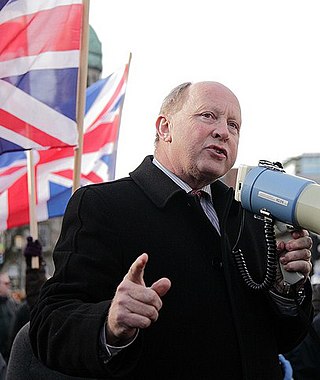
James Hugh Allister is a British Unionist politician and barrister in Northern Ireland. He founded the Traditional Unionist Voice (TUV) political party in 2007, leading the party since its formation. Allister has served as a Member of the Northern Ireland Assembly (MLA) for North Antrim since 2011, and is the TUV’s only representative in the Assembly.

North Down is a parliamentary constituency in the United Kingdom House of Commons. The current MP is Stephen Farry of the Alliance Party. Farry was elected to the position in the 2019 general election, replacing the incumbent Sylvia Hermon. Hermon had held the position since being elected to it in the 2001 general election, but chose not to contest in 2019.

Naomi Rachel Long MLA is a Northern Irish politician who has served as Minister of Justice in the Northern Ireland Executive since February 2024, having previously served from January 2020 to October 2022. She has served as leader of the Alliance Party since 2016 and a Member of the Legislative Assembly (MLA) for Belfast East since 2020.
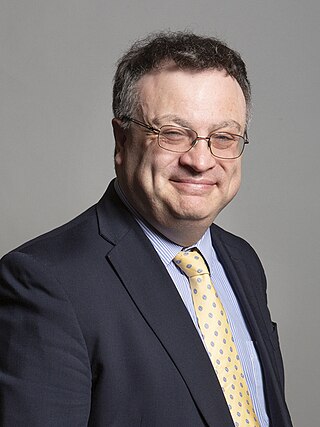
Stephen Anthony Farry is a Northern Irish politician who has served as the deputy leader of the Alliance Party of Northern Ireland since December 2016 and as Member of Parliament (MP) for North Down since 2019.
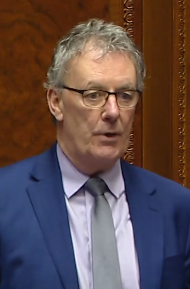
Michael Nesbitt, MLA is a Northern Irish politician and former broadcaster currently serving as the Minister of Health since 28 May 2024. He was the Leader of the Ulster Unionist Party (UUP) from 2012 to 2017 and has been a Member of the Northern Ireland Assembly (MLA) for Strangford since 2011.
Independent Unionist has been a label sometimes used by candidates in elections in the United Kingdom, indicating a support for British unionism.
The Northern Ireland Conservatives is a section of the United Kingdom's Conservative Party that operates in Northern Ireland. The Conservatives are the only major British party to field candidates within Northern Ireland and typically contests only a fraction of seats in elections. The party won 0.03% of the vote in the 2022 Northern Ireland Assembly election and 0.7% of the vote in the 2019 United Kingdom General election in Northern Ireland.

The Traditional Unionist Voice (TUV) is a unionist political party in Northern Ireland. In common with all other Northern Irish unionist parties, the TUV's political programme has as its sine qua non the preservation of Northern Ireland's place within the United Kingdom. A founding precept of the party is that "nothing which is morally wrong can be politically right".
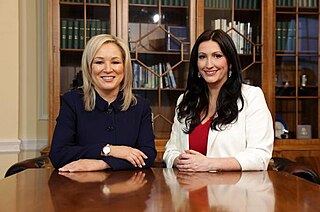
The First Minister and deputy First Minister of Northern Ireland are the joint heads of government of Northern Ireland, leading the Northern Ireland Executive and with overall responsibility for the running of the Executive Office. Despite the titles of the two offices, the two positions have the same governmental power, resulting in a duumvirate; the deputy First Minister, customarily spelled with a lowercase d, is not subordinate to the First Minister. Created under the terms of the 1998 Good Friday Agreement, both were initially nominated and appointed by members of the Northern Ireland Assembly on a joint ticket by a cross-community vote, under consociational principles. That process was changed following the 2006 St Andrews Agreement, such that the First Minister now is nominated by the largest party overall, and the deputy First Minister is nominated by the largest party from the next largest community block.
The Ulster Conservatives and Unionists, officially registered as the Ulster Conservatives and Unionists – New Force (UCUNF), was an electoral alliance in Northern Ireland between the Ulster Unionist Party (UUP) and the Conservative Party.
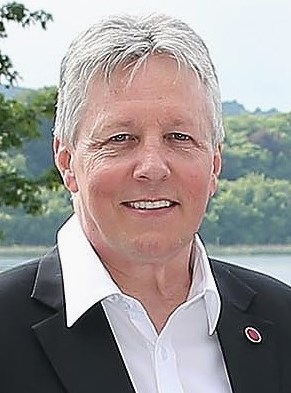
The 2010 United Kingdom general election in Northern Ireland occurred on 6 May 2010 and all 18 seats in Northern Ireland were contested. 1,169,184 people were eligible to vote, up 29,191 from the 2005 general election. 57.99% of eligible voters turned out, down 5.5 percentage points from the last general election.
References
- ↑ Devenport, Mark (12 May 2009). "Profile: Ian Parsley". BBC News. Retrieved 29 March 2012.
- ↑ "Parsley leaves the Alliance Party". BBC News. 11 September 2009. Retrieved 29 March 2012.
- ↑ "Board Members". Northern Ireland Screen. Archived from the original on 18 May 2011. Retrieved 29 March 2012.
- ↑ "Ian James Parsley's Ulster-Scots website". BBC NI. 20 March 2002. Archived from the original on 19 April 2013. Retrieved 29 March 2012.
- ↑ "Parsley quits politics". News Letter. JPI Media. 29 March 2011. Archived from the original on 1 February 2014. Retrieved 21 January 2014.
- ↑ "Ancient Romans couldn't read… and what that means for language". 30 January 2015.